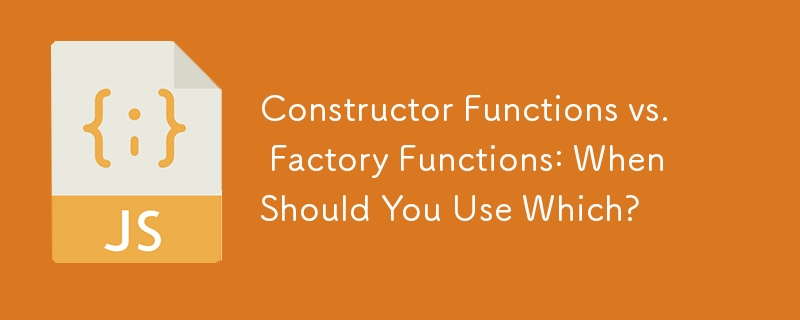Home >Web Front-end >JS Tutorial >Constructor Functions vs. Factory Functions: When Should You Use Which?
Constructor Functions vs. Factory Functions: When Should You Use Which?
- DDDOriginal
- 2024-11-15 03:54:02616browse

Distinguishing Constructor Functions and Factory Functions in JavaScript
In JavaScript, discerning the differences between constructor functions and factory functions is essential. This article clarifies their distinctions and provides guidance on choosing the appropriate option for specific use cases.
Constructor Functions
Constructor functions are invoked with the new keyword, initiating the creation of a new object. The this keyword within the function refers to the newly created object, and the function serves as a blueprint for its properties and methods.
function ConstructorFunction() {
this.property1 = 'value1';
this.method1 = function() { ... };
}
Factory Functions
Factory functions, unlike constructor functions, are invoked without the new keyword. They directly return a new object instance, providing more flexibility in object creation.
function factoryFunction() {
return {
property1: 'value1',
method1: function() { ... },
};
}
Choosing Between Constructor and Factory Functions
The choice between these two approaches depends on the specific scenario.
- Use a constructor function when you want to adhere to object-oriented programming principles, allowing for inheritance and polymorphism.
-
Consider a factory function when:
- You need to return objects of varying types, based on input parameters.
- You have complex object initialization sequences that require additional processing beyond simple property assignments.
By understanding these distinctions, developers can make informed decisions about when to employ constructor functions or factory functions, ultimately enhancing their code effectiveness and maintainability.
The above is the detailed content of Constructor Functions vs. Factory Functions: When Should You Use Which?. For more information, please follow other related articles on the PHP Chinese website!
Related articles
See more- An in-depth analysis of the Bootstrap list group component
- Detailed explanation of JavaScript function currying
- Complete example of JS password generation and strength detection (with demo source code download)
- Angularjs integrates WeChat UI (weui)
- How to quickly switch between Traditional Chinese and Simplified Chinese with JavaScript and the trick for websites to support switching between Simplified and Traditional Chinese_javascript skills

